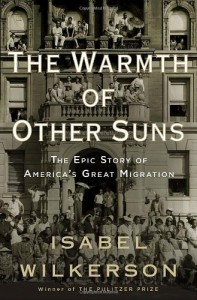 I am the grandchild and great-grandchild of white immigrants to America who came from southern and eastern Europe. This is not my story. But it is a story of moving from one homeland to another seeking a better life for oneself and one's children, and of how the "old country" is never truly left behind - and in that respect, it has elements in common with an immigrant story. However, the people Isabel Wilkerson writes about in The Warmth of Other Suns probably wouldn't call themselves immigrants; they moved from one part of their own country to another in hopes of more fully experiencing the rights and privileges of American citizenship.
I am the grandchild and great-grandchild of white immigrants to America who came from southern and eastern Europe. This is not my story. But it is a story of moving from one homeland to another seeking a better life for oneself and one's children, and of how the "old country" is never truly left behind - and in that respect, it has elements in common with an immigrant story. However, the people Isabel Wilkerson writes about in The Warmth of Other Suns probably wouldn't call themselves immigrants; they moved from one part of their own country to another in hopes of more fully experiencing the rights and privileges of American citizenship.When we talk about the mid-20th-century civil-rights movement, we're usually thinking of the struggles to end legal segregation in the American South. But Wilkerson's book demonstrates the ways that black people who left the South and its Jim Crow system for city life in the North and West changed that system from the outside - not by political means, but by the very fact of making lives away from it. It also illustrates that racist systems are more than capable of developing on their own, via cultural forces rather than force of law.
The subtitle of this book, "The Epic Story of America's Great Migration," is entirely accurate, but Wilkerson scales it to an approachable level by conveying it through the experiences of three individual migrants. Ida Mae Gladney, with her husband and children, made a stealthy departure from the Mississippi cotton fields during the heart of the Great Depression, first to Milwaukee and then to Chicago, where many Mississippi migrants had landed already. Uneducated sharecroppers willing to work hard, the Gladneys both eventually found long-term blue-collar jobs and established their family on Chicago's South Side. George Starling came from the citrus groves of central Florida, and was thwarted in his efforts to complete a college education by his own father and a culture that didn't see its value. But he learned enough to try to organize and get better pay for his fellow grove workers, and knew enough to slip out of state when his efforts became dangerous. George made it to New York in 1945, finding a home in Harlem and work on the railroad, attending to passengers on the north-south routes between New York and Florida and effectively living between both his worlds. Robert Pershing Foster grew up as the youngest son of two teachers in Monroe, Louisiana and always envisioned something more - college, medical school, a well-established family and career of his own, and life without the restrictions of Jim Crow. In 1953, he set out to find it in the Promised Land - Los Angeles - but never quite left behind everything he thought he did.
The stories of these three individuals are more than effective vehicles for illustrating the Great Migration via anecdote - they are riveting reading in their own right. I found the chapters leading up to and including each of their departures from the South particularly engrossing and suspenseful. However, the real achievement of the book is in making the context of these stories - the socio-economic, cultural, and legal climate surrounding them - equally compelling. The Warmth of Other Suns is a well-researched work that blends oral and academic history in a thoroughly accessible manner.
As I said earlier, The Warmth of Other Suns does not tell my story - but it tells a story I really didn't know, and one that I think I needed to know. It's a story that I suspect most Americans don't know nearly enough about - and we need to know it. The story is an essential piece of contemporary history, and one that we need to understand better. As told in this book, it's eye-opening, enlightening, frightening, inspiring, and provocative in the best way. Please don't be intimidated by that 600-plus page count - it moves quickly, and it's hard not to get swept up in it. This is a must-read.




